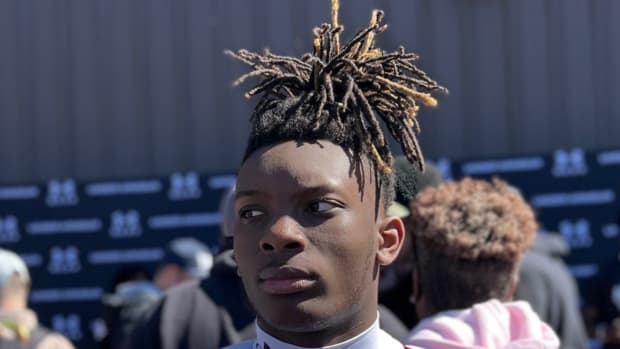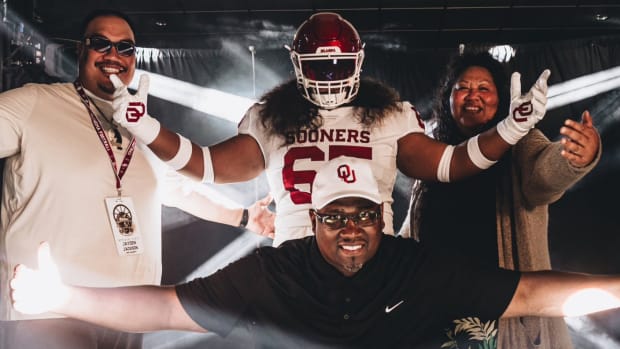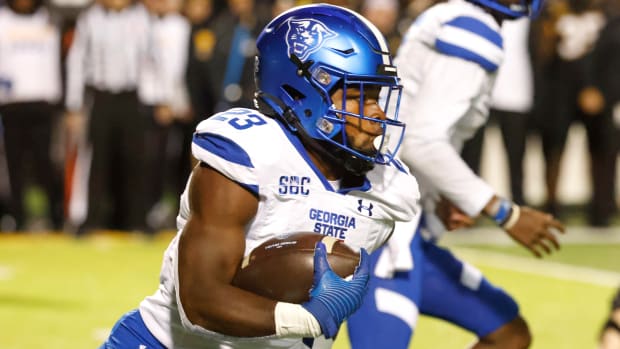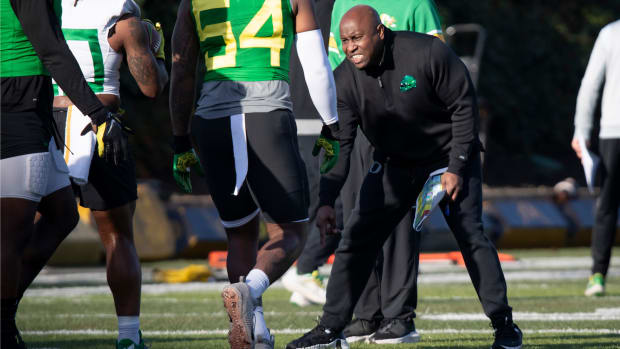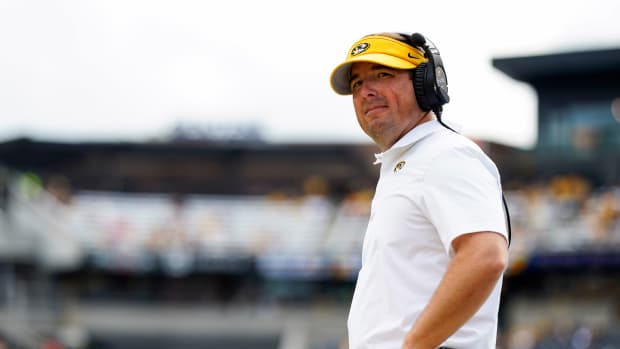All in: Extensions for Fitzgerald, Collins show Northwestern's commitment to winning big
CHICAGO — On Tuesday afternoon, Northwestern reconfirmed which side of the college athletics divide it planned to occupy. To do so, the university carved out a corner of 30,000-square foot Under Armour brand house downtown, officially announcing multiyear, big-bucks contracts for coaches Pat Fitzgerald and Chris Collins at a podium flanked by mannequins in full football and basketball gear. A few feet away, a big screen gleamed with images of both coaches and COMMITTED in oversized purple type. The setting fit the moment. Where better to scream to the world that you’re spending big than a spot along Michigan Ave., the city’s central artery for ritzy retail and commerce?
“This is a championship commitment,” Fitzgerald declared, and taken more figuratively than literally for a place that hasn’t won a Big Ten title in either sport in 17 years, the 42-year-old coach’s statement was less breaking news than a telling reminder. A few miles away, a new $260 million football facility occupies a 500,000-square foot parcel of Lake Michigan coast with a view of the downtown skyline. Not far from that, the basketball arena is gutted, with debris everywhere in the first stages of a $150 million renovation that will also create a practice gym. And now the leaders of programs that drive attention, emotion and revenue at any school both reportedly get paid well more than $3 million per year for the next decade or so—rates that don’t drive the market, but are nevertheless reasonably in step with it.
With 10-year extension, Northwestern bets big on Pat Fitzgerald to take next step
Decisions to spend a lot of money on buildings and a lot of money for a lot of years on coaches don’t come easy at most places. But there are no half-measures for any major-conference athletic department anymore. You build to win or you lose at a fantastic pace. You’re in, or you’re irrelevant. To chart Northwestern’s path, just follow the money. “Either we’re going to go for it, and really be competitive nationally, or we’re not, and we should take a different route,” athletics director Jim Phillips said. “Those are choices institutions have to make. I don’t have to remind anybody about the University of Chicago back in the 1940s, a founding member of the Big Ten. At some point, they just had enough. That was not going to be a commitment they wanted to make. I think the university has spoken clearly—we’re going in a completely different direction.”
The upgraded real estate and contracts don’t guarantee results. Without them, though, Northwestern’s football and men’s basketball endeavors would realistically exist in a limbo state of middling-to-decent performance. It would be increasingly difficult to win consistently. It would be almost impossible to chase championships. “We wouldn’t be able to compete at our level without that commitment,” Fitzgerald said. Big-picture thinking didn’t occur much when he was a neck roll-wearing linebacker in Evanston or even when he was an assistant coach at his alma mater. But once Fitzgerald took charge of the program following Randy Walker’s sudden death in 2006, the gap between what’s required to succeed and what Northwestern had actually provided its coaches and athletes became staggeringly apparent.
Out of the rubble: How Northwestern finally broke through to claim its first NCAA tournament bid
“When I talk to some of the guys that played in the 1980s, man, I just want to give them a hug,” Fitzgerald said. “Because they didn’t have a chance. They weren’t supported. It’s a shame.”
Collins, meanwhile, recently spent time discussing the logistics involved in utilizing an outdated arena, busing players to practice and then back to class, bunking at a hotel in the suburbs even on the nights before home games. This was all a good thing. The 43-year-old was picking the brains of DePaul officials about playing at Allstate Arena, the unspectacular venue in Rosemont, Ill., that will serve as the temporary home for Northwestern basketball in 2017-18 while Welsh-Ryan Arena undergoes its sorely needed overhaul.
For the first time at Northwestern, a less-than-ideal home setup is reason for optimism. “I’d like to say I’m surprised, but I’m not,” Collins said. “Nothing was ever promised to me—it was kind of a leap of faith of believing that they do want to be committed to getting this right, and being a major player, and being a Big Ten-caliber athletic program. Each year, with whatever it may be—facility changes, the way we feed our guys, the way we travel, all those things—little by little now we’ve gotten ourselves to where we operate like a high Division I basketball and football program should. It’s a direct result of Jim and his leadership to get that done.”
Is Northwestern ready for elevated expectations?
The potential benefit of facility upgrades is plain. Why is the spending spree on head coaches as crucial?
Sift through Tuesday’s high-minded patter about institutional “fit” and chuckling over the rapport between Collins and Fitzgerald, and you are left with a not-insignificant nugget of truth: There’s value in retaining competent coaches who are happy to deal with coaching at Northwestern.
Collins led the basketball team to its first NCAA tournament ever last spring and should have a team equipped to finish near the top of the Big Ten next year, but he is only four seasons into his head coaching career. Fitzgerald has a 77-62 career record and two 10-win seasons in 11 years. Surely, there are other coaches who are equipped to achieve similar results. There may not be as many coaches as willing to deal with the very real academic complications that keep the recruiting pool relatively shallow, and maybe still fewer who wouldn’t complain about it. (Consider this kernel reported by the Chicago Tribune in March and confirmed by Sports Illustrated: Of the 46 high school football players in Illinois that range from certain to borderline Division I-caliber prospects in the Class of 2018, only 12, at best, could be admitted to Northwestern.)
Because Collins and Fitzgerald are apparently enthusiastic enough about taking on that dynamic, and because they can apparently win games while doing it, spending big to retain them—while including what Phillips described as “cost-prohibitive” buyout provisions—is a sensible bet. “If you are reactive with any of your coaches,” Phillips said, “your coaches are going to be gone.” So then Northwestern is left to hope the shiny new resources afforded to both men dovetail with their ability to coach well, which keeps the victories and the money flowing in. According to Phillips, the athletic department has raised more than $330 million in the last three plus years.
'I'm going to make sure that never happens again': Inside Brian Kelly's Notre Dame overhaul
“You have to have traction in your two anchor sports,” Phillips said. “You just have to. They supply the energy, the emotion, but then they supply the finances, right? So when you try to raise money for a football facility on the lakefront or a basketball arena, [donors] want to know the leadership is right.”
Both coaches insisted they weren’t going anywhere, anyway. Fitzgerald described his family as “owners, not renters,” and by now it’s fairly evident virtually no college job could lure him away from Evanston. Collins may never escape the specter of Duke calling when Mike Krzyzewski calls it quits, but he also has been steadfast in public statements about a commitment to Northwestern. Tuesday was no different. “It was never about being here to go somewhere else,” Collins said. “I came to Northwestern to be the Northwestern coach for a long time.”
Coaching grades: Which programs made the best hires this off-season?
New contracts and new buildings should assure that for both coaches. Their employer has made its choice: Northwestern may not set precedent in the college athletics resources race, but it is willing to pay to keep pace. That had not always been the case. “This place has changed,” Phillips said. After the news conference crowd had dispersed Tuesday, the athletic director walked out to bustling Michigan Ave. with his two head coaches. They found a spot on a median along a strip renowned for high price tags and big spenders, then turned toward a photographer arm-in-arm and smiled wide.

